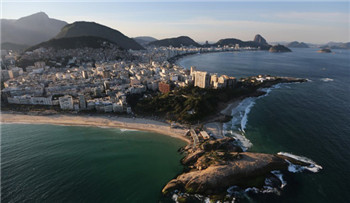(单词翻译:单击)

A group of Brazilian scientists has detected a drug-resistant bacteria growing off some of Rio de Janeiro's most stunning beaches, in research being published a month before the city hosts the 2016 Olympic Games.
巴西一组科学家在里约热内卢最美丽的一些海滩外发现了耐药性细菌。这一研究结果在2016里约奥运会开幕前一个月公布。
According to lead researcher Renata Picao, the "super bacteria" entered the city's waterways when sewage coming from local hospitals got channeled into the bay.
据首席研究员雷娜塔•皮康称,“超级细菌”在当地医院的污水流入海湾的过程中进入了城市水道。
"We have been looking for 'super bacteria' in coastal waters during a one-year period in five beaches," Picao told CNN during a visit to her lab. "We found that the threats occur in coastal waters in a variety of concentrations and that they are strongly associated with pollution."
皮康在CNN探访其实验室时表示:“过去一年里我们一直在五个海滩的沿海水域寻找‘超级细菌’。我们发现,沿海水域的细菌威胁程度不一,并且与污染极为相关。”
The samples were collected between 2013 and 2014. The superbug found was carbapenem-resistant Enterobacteriaceae, or CRE.
研究样本收集于2013至2014年。所发现的超级细菌是耐碳青霉烯类肠杆菌,简称CRE。
Picao said there is no reason to believe the levels have changed because raw sewage continues to flow into many waterways. She said the next step is to test the impact these bacteria can have when humans come in contact with them in coastal waters.
皮康说,鉴于未经处理的污水持续流入众多水道,并没有理由相信问题的状况得到了改变。她表示,下一步将测试这些细菌对沿海水域与之有接触的人类可能产生的影响。
The news comes as Rio prepares to host hundreds of thousands of athletes and tourists during next month's Summer Olympics.
研究结果发布的同时,里约正准备接待上百万运动员和游客。他们将在下个月的夏奥期间到访。
Among the beaches flagged were Flamengo and Botafogo, which border the bay where Olympic sailors are scheduled to compete.
亮起红灯的海滩包括弗拉门戈和博塔弗戈海滩,它们邻近即将举办奥运帆船赛事的海湾。
"It's a nice sailing area but every time you get some water in your face, it feels like there's some alien enemy entering your face," German Paralympic sailor Heiko Kroger said during a recent visit to Rio. "I keep my nose and my lips closed."
德国的残奥会帆船选手海科•克罗杰在近期拜访里约时说:“这里很适合帆船项目,但每次脸上沾到水,就感觉像受到了外敌攻击。我得一直捂好鼻子,闭紧嘴唇。”
Kroger believes the super bacteria may have caused a severe skin infection in one of his teammates during recent training.
克罗杰认为,在最近的训练中,超级细菌可能已经导致他的一位队友出现严重皮肤感染。
Picao said she believes the city's fragile sanitation infrastructure is responsible for the presence of the super bacteria.
皮康说,她认为里约薄弱的卫生基础设施是超级细菌出现的原因。
"This bacteria colonizes the intestine and it goes along with feces to the hospital sewage," Picao said. "We believe that hospital sewage goes into municipal sewage and gets to the Guanabara Bay or to other rivers and finally gets to the beach."
她表示:“这种细菌占领肠道,并伴随排泄物进入了医院的污水。我们相信医院污水汇入城市污水后又流入了瓜纳巴拉湾或者其他河流,最终到了海滩。”
When Rio made its bid to host the Summer Games back in 2009, it promised to clean up the polluted waterways and connect 80% of homes to the sewage system.
里约在2009年申请承办夏季奥运会时,承诺会清理受污染的水道并将80%的家庭纳入下水道系统中。
Despite concerns, neither Picao nor international Olympic authorities recommend moving the sailing venue.
尽管有这些担忧,皮康和国际奥林匹克相关机构都没有建议更换帆船赛事场地。
The other beaches that tested positive for the bacteria were Leblon and Ipanema, which are very popular among tourists and locals alike.
检测到超级细菌的海滩还有莱伯伦和伊帕尼马,它们在游客和当地人中都很受欢迎。
"I don't take my children to these beaches," Picao said. "We still need more studies to tell what would be the risk to human health of this exposure through the water."
皮康说:“我不会带我的孩子去这些海滩。我们还需要更多的研究来了解在水中与细菌接触会对人类健康造成怎样的风险。”


